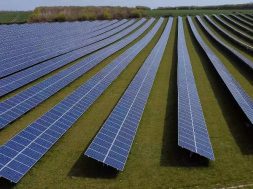
Why Borosil’s innovation will temper solar power rates
AHMEDABAD, OCTOBER 12: The price per unit of solar power is set to head further south, thanks to an innovation by Borosil, the well-known glassmaker. Now, solar modules can produce 30 per cent more power with an enhanced life from 25-40 years.
The innovation can also be used in setting up floatable solar plants on water bodies, including oceans.
The new technology, innovated by Gujarat Borosil Ltd (GBL), was launched by R Chidambaram, Principal Scientific Advisor to the Government of India, on October 10 when he inaugurated the new tempered glass production facility of the company, which already makes high-performing solar glass at its 100-acre plant at Bharuch, Gujarat.
Reduced cost
In 2014, GBL had eliminated the deadly poison antimony from its batch.
“GBL has so far invested ₹200 crore on the facility, promoted by Borosil Glass Works Ltd. The investment includes the ₹55 crore on the new plant which has set up a 150-ton per day low iron-patterned glass furnace for manufacturing high-transmission glass used in solar industry,” Pradeep Kheruka, Vice-Chairman, Borosil Glass Works, told BusinessLine.
The output of solar glass, with this capacity, is enough to manufacture modules to produce 1 GB of solar modules annually.
The company, which can produce glass with a thickness ranging from 2-10 mm, has successfully completed production trials of the fully-tempered 2-mm solar glass, which is expected to herald a quantum leap in the mission to increase the efficiency of solar modules.
“This would further lower the cost of power and significantly improve the viability of solar power for consumers,” Kheruka said.
The 2-mm tempered glass is not only lighter than the current world standard of 3.2 mm, but also absorbs less solar energy while allowing higher irradiance to reach the solar cell. This will help in harnessing solar energy more efficiently than before. The use of high-transmission glass in solar cells will enhance module efficiency by 30 per cent, Kheruka explained. That is, the same bifacial module will produce 100 per cent energy on one side of the glass, and 30 per cent on the other.
The polymer back-sheet used in the conventional solar module has been identified as an important source from which module failures arise. The glass used at the back in new modules will allow uniform and better heat dissipation, leading to a more stable operation of the panel and greater longevity.
The glass-to-glass light weight modules can be installed on the roof or even as the roof itself without expensive structural reinforcements thereby making it more economical for people to switch to solar energy, he said.
Test trial
Field trials at its 302.4 kWp rooftop R&D installation proved that modules using the new solar glass generated 7.5 per cent more electricity than modules using solar glass from a leading European solar manufacturer. Also, this glass has the highest resistance to potential induced degradation (PID) when compared with solar glass from European and Chinese manufacturers, thus enhancing the age of modules from 25 years now to 40 years. The Borosil 2-mm textured solar glass has the lowest iron content in the world, free of toxic antimony and arsenic, and its anti-reflective coating makes it durable, he said.
SPF, a leading test institute in Switzerland, has measured the glass efficiency of the Borosil product as 0.952, thus putting it at the highest efficiency amongst the glasses tested by them. The glass will find application in photo-voltaic modules, solar thermal flat plate collectors, and high-efficiency greenhouses.
The product and the facility have been professionally accredited globally for compliance with international standards by TUV Rheinland, Germany, SPF Switzerland and Westpak, USA.














